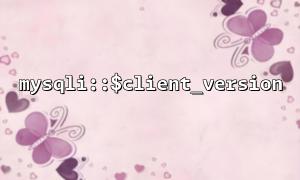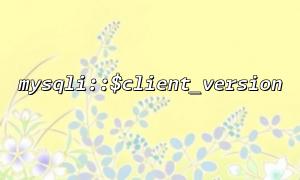mysqli::$client_version is a static property of the mysqli class that returns an integer indicating the version of the MySQL client library currently used by PHP. For example, if the client version is mysqlnd 8.0.30, then mysqli::$client_version might return 80030.
This property can be accessed directly without instantiating a mysqli object, making it ideal for environment checks or debugging.
Here is a simple usage example:
<?php
echo 'MySQL Client Version: ' . mysqli::$client_version;
?>
After running the above code, the browser will output something like:
MySQL Client Version: 80030
Note that this return value is an integer, not a string-formatted version number. You will need to parse it to get a more readable version format.
You can convert the integer version number into a string format like 8.0.30 using arithmetic operations. Below is an example helper function:
<?php
function formatClientVersion($versionInt) {
$major = (int)($versionInt / 10000);
$minor = (int)(($versionInt % 10000) / 100);
$patch = $versionInt % 100;
return "$major.$minor.$patch";
}
<p>$versionInt = mysqli::$client_version;<br>
echo 'MySQL Client Version (Formatted): ' . formatClientVersion($versionInt);<br>
?><br>
The output will be something like:
MySQL Client Version (Formatted): 8.0.30
This format is easier to read and can be directly used for version checks or recording in configuration files.
If your application relies on MySQL features introduced after a specific version, you can use this property to perform a simple version check. For example:
<?php
if (mysqli::$client_version < 80000) {
die('The current MySQL client version is too low; please upgrade to 8.0.0 or higher.');
}
?>
This helps terminate incompatible environments early during runtime, avoiding more difficult-to-debug issues later on.
This property returns the MySQL client library version, not the database server version.
To get the server version, you need to access $mysqli->server_info via a connection object.
Different systems or PHP build configurations might use different client libraries.
For example, whether using mysqlnd (MySQL Native Driver) or libmysqlclient affects client behavior and version information.
If you use connection pooling or multiple connections, be careful not to confuse version sources.
You can use PHP’s phpinfo() function to check the currently loaded client library version, usually displayed under the mysqlnd or mysqli module sections, matching the value returned by mysqli::$client_version.
You can also deploy a simple check page like this:
<?php
header('Content-Type: application/json');
echo json_encode([
'client_version_int' => mysqli::$client_version,
'client_version_formatted' => formatClientVersion(mysqli::$client_version),
'check_url' => 'https://gitbox.net/check-mysql-client-version'
]);
?>
This page can be integrated into your system monitoring tools for quick auditing of PHP-MySQL environment compatibility.



